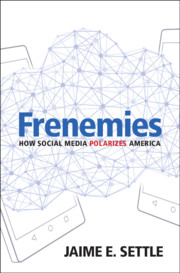Book contents
- Frenemies
- Frenemies
- Copyright page
- Epigraph
- Contents
- Figures
- Tables
- Acknowledgments
- 1 A Fundamental Change in Political Communication
- 2 Facebook in Context: Theorizing Interaction on Twenty-First-Century Social Media
- 3 The END Framework of Political Interaction on Social Media
- 4 How Do END Interactions on the News Feed Psychologically Polarize Users?
- 5 In the Eye of the Beholder: Politically Informative News Feed Content
- 6 Political Inference from Content on the News Feed
- 7 Biased Inference from END Interactions
- 8 Judging the Other Side
- 9 Erasing the Coast of Bohemia in the Era of Social Media
- References
- Appendices
- Index
6 - Political Inference from Content on the News Feed
Published online by Cambridge University Press: 17 August 2018
- Frenemies
- Frenemies
- Copyright page
- Epigraph
- Contents
- Figures
- Tables
- Acknowledgments
- 1 A Fundamental Change in Political Communication
- 2 Facebook in Context: Theorizing Interaction on Twenty-First-Century Social Media
- 3 The END Framework of Political Interaction on Social Media
- 4 How Do END Interactions on the News Feed Psychologically Polarize Users?
- 5 In the Eye of the Beholder: Politically Informative News Feed Content
- 6 Political Inference from Content on the News Feed
- 7 Biased Inference from END Interactions
- 8 Judging the Other Side
- 9 Erasing the Coast of Bohemia in the Era of Social Media
- References
- Appendices
- Index
Summary
- Type
- Chapter
- Information
- FrenemiesHow Social Media Polarizes America, pp. 136 - 160Publisher: Cambridge University PressPrint publication year: 2018



